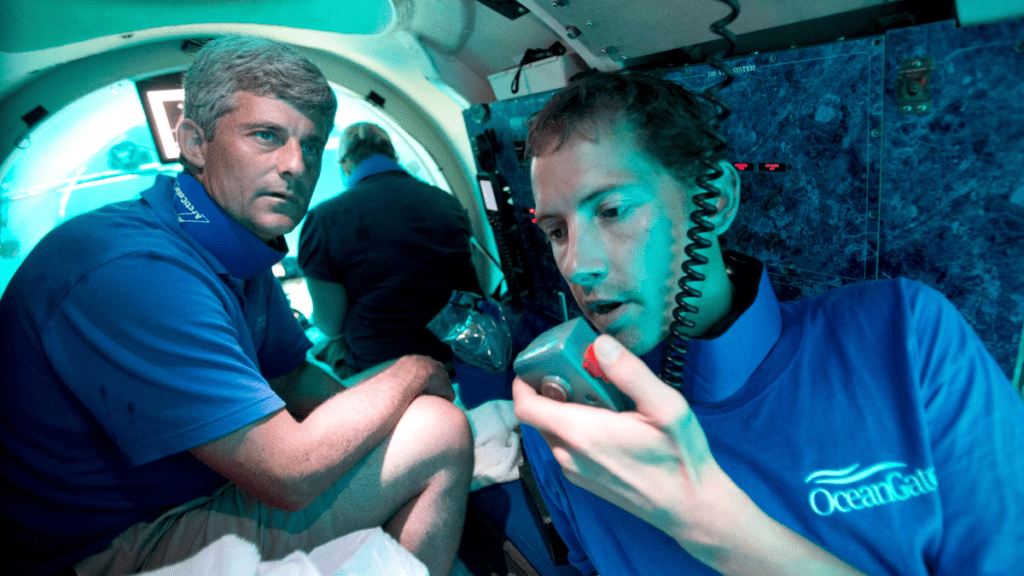OceanGate CEO Wanted To ‘Buy A Congressman’ If Titan’s Titanic Dives Were Blocked

The CEO of the company behind the doomed Titan submersible that imploded killing five people last year was reportedly prepared to go to extreme measures to get his controversial craft in the ocean. Former OceanGate boss Stockton Rush reportedly told colleagues that he was prepared to bribe lawmakers if it meant his missions to the depths of the Titanic could get underway.
A U.S. Coast Guard inquiry has been launched into the disaster, which killed Rush last year as well as passengers Hamish Harding, Shahzada Dawood and his son Suleman, and Paul-Henri Nargeolet. The panel investigating the Titan implosion has so far heard that the sub’s chief engineer was fired for raising concerns with the design, the craft crashed days before the disaster and Rush once claimed that “no-one is dying” on one of his missions.
Now, the investigation has heard that Rush was prepared to stoop to bribery in order to get his missions into the ocean, reports CNN. While undergoing questioning at the inquiry, former OceanGate employee Matthew McCoy said that Rush once told him that he “would buy a congressman” in order to make any problems “go away,” as CNN explains:
McCoy, a former Coast Guard member who was in the US Coast Guard Reserve at the time, brought up safety and regulatory concerns about the expedition at the meeting which Rush said they would get past by going through the Bahamas and launching out of Canada.
“The conversation basically ended when he, after explaining that the Coast Guard had tried to shut him down, down in California, and that he wouldn’t operate there anymore, but that if the Coast Guard became a problem, that he would buy himself a congressman and make it go away,” McCoy said during the final day of the US Coast Guard Marine Board of Investigation’s hearing.
“Mr. McCoy, is that a direct quote?” asked Jason Neubauer, the chair of the Coast Guard’s Marine Board investigation that is reviewing the cause of the Titan’s implosion.
“He said, ‘I would buy a congressman’ and make, basically, the problems would go away at that point in time,” McCoy said. “That will stand in my mind for the rest of time. I’ve never had anybody say that to me directly, and I was aghast and basically, after that, I resigned from the company.”
Those “problems” could relate to the controversial design of the Titan sub, which Rush once claimed was approved by NASA and other high-profile organizations. However, one by one those bodies distanced themselves from the project following the disaster.
The sub’s design was criticized by the rest of the industry. Photo: Ocean Gate / Handout/Anadolu Agency (Getty Images)
The craft’s design comprising a carbon fiber tube with a round, titanium cap and each end didn’t match the tried and tested look of other deep-diving subs, reports Futurism. Because of this, it failed to get regulatory approval so was run as an experimental craft, as the site adds:
Since then, the submersible’s design has come under intense scrutiny. Experts have criticized Rush’s decision to make the hull out of carbon fiber, as well as its unusually shaped design that’s considered ill-suited to handle immense pressures.
The recently wrapped-up hearing aired out many of these criticisms from over two dozen employees who worked at OceanGate, as well as experts from third parties like NASA and Boeing, who were asked to consult in a role that both parties maintain was minimal and overblown by Rush.
The inquiry into the Titan disaster has now concluded, with the Coast Guard’s Maritime Board of Investigation now analyzing all the evidence it’s heard. A full report could then be published by the board to outline everything that led to the craft’s implosion and the death of all five people onboard.




